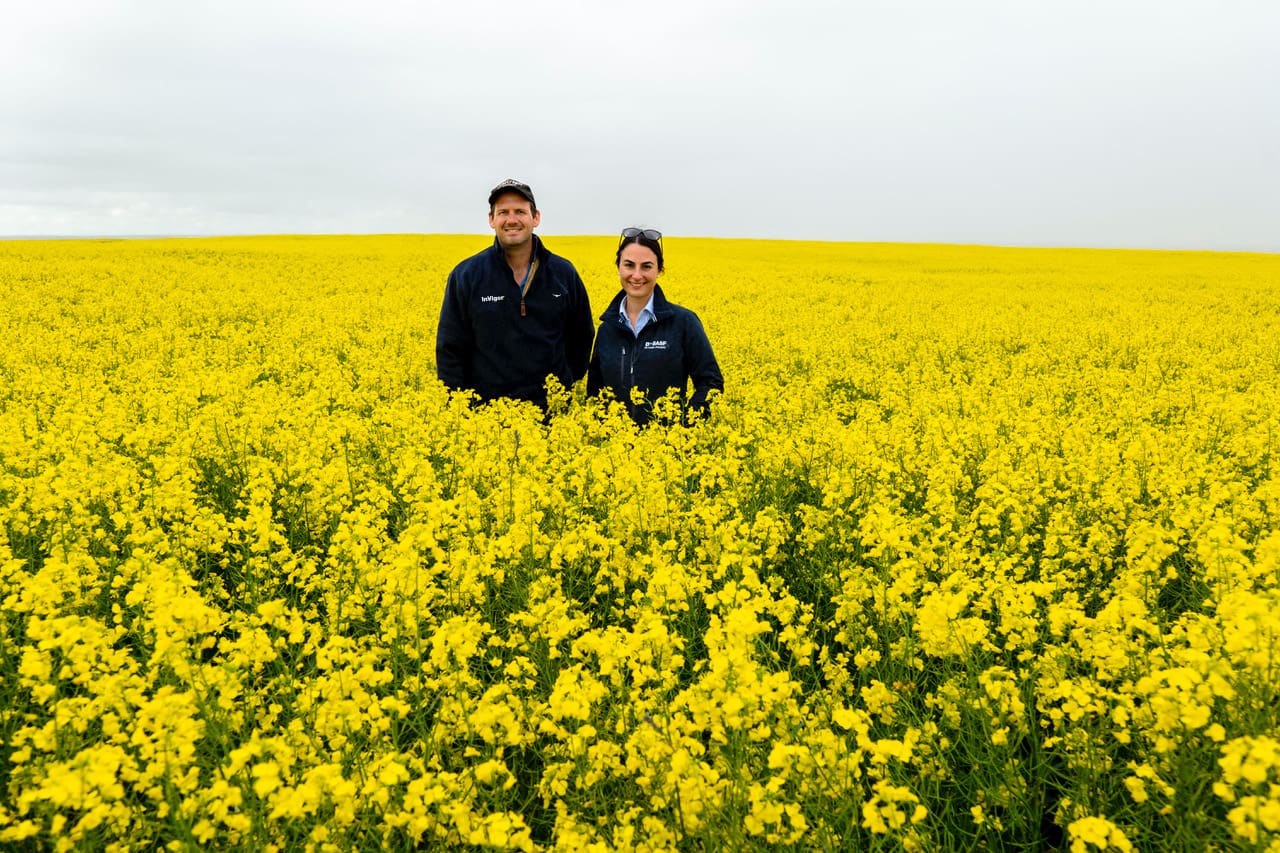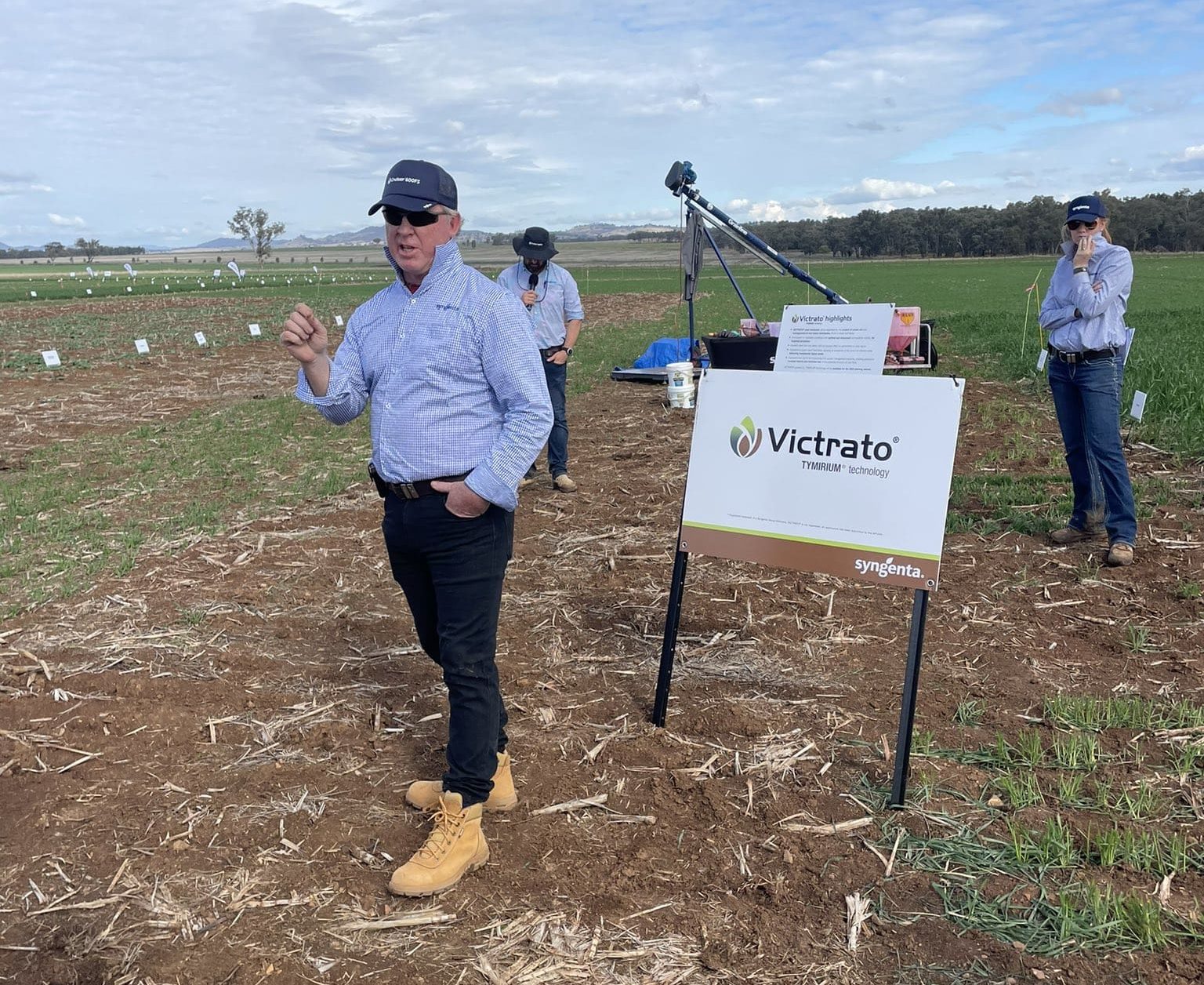
Western Australian grower Scott Walker and BASF Central Wheatbelt broadacre crop specialist Caroline Dix in a paddock of InVigor LR 4540P canola. Photo: BASF
THE Australian Pesticides and Veterinary Medicines Authority has had a tough few years.
They started in 2016, when the then Coalition Government announced the national regulator would be moving from Canberra to Armidale.
Move it did, and the current Labor Government last week gave its preliminary response to a review into the agency which means it will stay in Armidale, where APVMA staff working there and remotely are no doubt looking forward to some smoother sailing, especially once a permanent CEO is found.
Welcomed by industry
Last week’s announcement by Federal Agriculture Minister Murray Watt that the APVMA would be staying put has been welcomed by agricultural chemical representative body CropLife Australia.
“While CropLife was one of the most vigorous and loud critics of the relocation of the APVMA to Armidale under the previous government, we support the Minister’s decision not to make the same mistake twice,” CropLife Australia CEO Matthew Cossey said.
“Considering the recent history of the agency, preventing further disruptions and providing stability for staff and its operations is a crucial factor to improving its performance.”
Along with the chemical companies it represents, CropLife Australia is hoping for a pick-up in performance to help its members get some new chemistry into the paddock, with criticisms of APVMA outlined in an April 9 statement.
In it, Mr Cossey said the December 2023 quarter was the sixth consecutive quarter that the APVMA timeframe performance for major pesticide applications has “languished below its own downgraded self-imposed targets.”
“Unfortunately, the APVMA’s failure to meet its statutory timeframe obligations is now having very real consequences for effective management of crippling pests and diseases,” Mr Cossey said.
“Fall armyworm, red-legged earth mite, powdery mildew and fusarium crown rot are costing the farming sector dearly.
“Fusarium crown rot alone costs the farming sector more than $400 million a year.”
While the chemical companies themselves apply to the APVMA for approval of new chemistry, peak national grower body Grain Producers Australia lodges applications for permits for off-label use of pesticides to control disease, insects and weeds in specific crops on a season-by-season basis.
Prior to Mr Watt’s announcement last week, GPA had been equally scathing of the APVMA’s lacklustre performance, and recently criticised delays in the APVMA’s approval process for products and permits.
“It’s…very, very frustrating to hear the APVMA’s performance is causing delays in registering major products needed to manage crown rot, which, if we don’t have it in time this season, could cost the Australian grain sector about $400 million in lost productivity, just this year,” GPA RDE spokesperson Andrew Weidemann said in a statement.
Hold-up for Victrato
Grain Central understands references to crown rot from both lobby groups allude to Victrato, which appears to be spending much longer tied up in the APVMA process than was bargained for by its manufacturer, Syngenta.
In a contributed item in the February 2024 edition of Rural Business, Syngenta said: “This winter will mark the beginning of a new era in Australian cereal production, with Victrato seed treatment hitting the market.”
Maybe next winter.
According to a statement from a Syngenta spokesperson provided to Grain Central on Friday: “Syngenta is continuing to work with the APVMA to advance our application for registration of Victrato and we hope to have good news for farmers next season.”
Of that there is no doubt, as evidenced by Victrato appearing in the title of two sessions at the GRDC Update held last month in Goondiwindi, where delegates are keen to add another tool to the kit to counter crown rot, always a threat to durum and bread-wheat yields and quality in the wider region.

Delta Ag northern NSW consultant and Crown Analytical Services principal Rob Long speaking at a field day in July 2023. Photo: Rob Long
Featuring Syngenta’s patented Tymirium technology, Victrato is a seed treatment that targets soil-borne fungal diseases including crown rot with its active ingredient cyclobutrifluram, a new succinate dehydrogenase inhibitor.
Syngenta has not responded to Grain Central’s inquiry about where Victrato has been approved for broadacre use globally, or when its application to the APVMA was lodged.
Syngenta platforms indicate Victrato was launched globally in May 2022, at which time it had been registered for use in El Salvador.
Approval for use in Argentina was granted later in 2022, and a Syngenta US statement issued on 26 February 2024 said Victrato was awaiting approval, expected in time for the 2025 growing season, from the US Environmental Protection Agency.
Tymirium technology also combats nematodes, and it has been approved for use in corn, soybean and some horticultural crops in countries outside North America, Europe, and Australia.
A paper published on January 2024 in the ScienceDirect journal indicates Tymirium is currently being registered by Syngenta for controlling crown rot in wheat in China.
Approval process deserves respect
Regulatory authorities like the APVMA have timelines for assessments, and Bowden Rural Services consultant Phil Bowden said these can be hard to meet.
Having done project work in the past as an independent reviewer for the APVMA, Mr Bowden said the regulator is sometimes dealing with applications that have insufficient material for a decision to be made.
“They are slow but they’re thorough,” Mr Bowden said of the APVMA.
“I’ve done 10 or so reviews…and some data that comes in from chemical companies is pretty ordinary.
“You might have to go back to them four or five times and ask them to provide more data.”
It means companies that have submitted sufficient data for assessment can get caught up in the traffic through no fault of their own, a situation that has no doubt been exacerbated by the APVMA’s move to Armidale and related personnel changes.
Revystar ready to roll
One product which growers will have access to for the first time this season is BASF’s Revystar, a co-formulated fungicide with two modes of action.
BASF lodged its initial application for Revystar in 2020, and withdrew it in 2021, then resubmitted in 2023 when CODEX maximum residue levels were approved.
On April 10, BASF announced it had received APVMA approval for Revystar, which is already available in New Zealand, Ireland, the United Kingdom, and some European countries.

BASF’s David Elmouttie.
“The launch of Revystar is great news, particularly for canola growers,” BASF head of broadacre agricultural solutions ANZ David Elmouttie said in a statement.
“It will enhance the protection of valuable crops against sclerotinia and upper canopy blackleg, two costly diseases that can be found in canola.
“By preventing yield losses and reduced grain quality, it will deliver an excellent return on a comparatively small investment.”
Revystar is registered to control sclerotinia, and seedling and upper canopy infection blackleg in canola.
In cereals, it is registered to control six diseases in barley, including both forms of net blotch; three diseases in oats and oaten hay, and five diseases in wheat, including both Septoria tritici blotch and Septoria nodorum blotch, as well as yellow leaf spot.
Revystar is powered by mefentrifluconazole, trademarked as Revysol Active, a Group 3 fungicide, and fluxapyroxad registered as Xemium, a Group 7 active.
The APVMA also issues special permits for pesticides for off-label use, and one recent application came from the Australian Oilseeds Federation in response to damaging silverleaf whitefly populations in soybeans.
Its application for an emergency-use permit was lodged on February 29, and permit PER89779 was issued on March 15; it expires on 31 March 2026.
Following is APVMA’s response to Grain Central’s inquiry relating to time taken for it to assess products:
The APVMA recognises that timely completion of agvet chemical assessment is important to the regulated industry and Australian agriculture. Our decisions are based on whether the application, including supporting documentation and information satisfies the statutory criteria in the legislation and legislative instruments which govern our regulatory activity. These criteria include safety (including for human health, the environment, and crop or animal to be treated), efficacy, trade and label requirements. Determining whether the criteria are satisfied can require an extensive assessment process, involving detailed evaluation of the data submitted as well as information available through sources such as published literature.
Grain Central: Get our free news straight to your inbox – Click here



The public record shows the Syngenta Victrato cereal (wheat and barley seed) application was submitted with the APVMA on 3rd September 2021. Nominally such an application takes ~15 months for registration. Suggests additional data was requested by the APVMA and this is still undergoing evaluation. Note too, the APVMA also applies generous time penalty provisions as Syngenta are no doubt also experiencing for finalisation of this application.